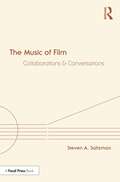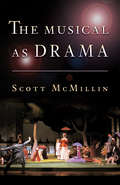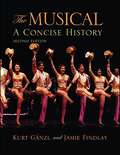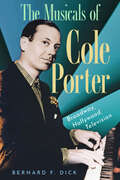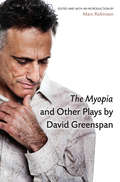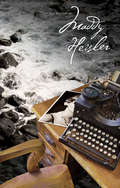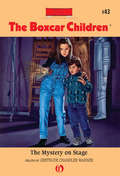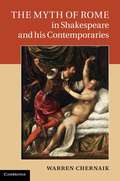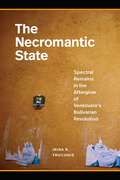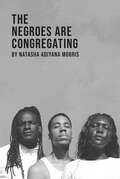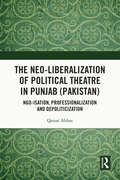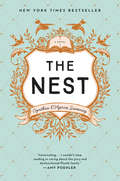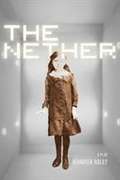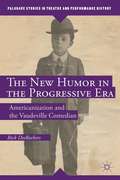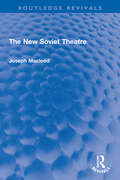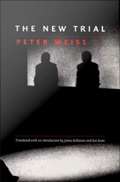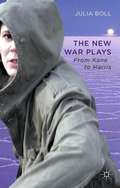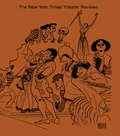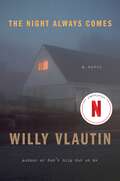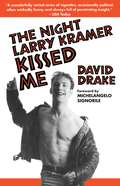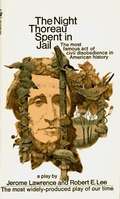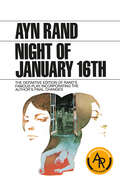- Table View
- List View
The Music of Film: Collaborations and Conversations
by Steven A. SaltzmanThe Music of Film opens up the world of film music from the inside. Through a series of interviews and conversations with professional composers, music supervisors, music editors, and picture editors, this book shows how music for film and television works according to insiders in the industry. Here we find a comprehensive collection of techniques and personal insights and get a unique perspective on how these key players in postproduction interact, collaborate, and successfully build their careers. The Music of Film is essential reading for composers, editors, directors, and producers—aspiring and established alike—or anyone interested in learning how to start or manage a profession working with music in feature films, television, and other media.
The Musical as Drama
by H. Scott McMillinDerived from the colorful traditions of vaudeville, burlesque, revue, and operetta, the musical has blossomed into America's most popular form of theater. Scott McMillin has developed a fresh aesthetic theory of this underrated art form, exploring the musical as a type of drama deserving the kind of critical and theoretical regard given to Chekhov or opera. Until recently, the musical has been considered either an "integrated" form of theater or an inferior sibling of opera. McMillin demonstrates that neither of these views is accurate, and that the musical holds true to the disjunctive and irreverent forms of popular entertainment from which it arose a century ago. Critics and composers have long held the musical to the standards applied to opera, asserting that each piece should work together to create a seamless drama. But McMillin argues that the musical is a different form of theater, requiring the suspension of the plot for song. The musical's success lies not in the smoothness of unity, but in the crackle of difference. While disparate, the dancing, music, dialogue, and songs combine to explore different aspects of the action and the characters. Discussing composers and writers such as Rodgers and Hammerstein, Stephen Sondheim, Kander and Ebb, Leonard Bernstein, and Jerome Kern, The Musical as Drama describes the continuity of this distinctively American dramatic genre, from the shows of the 1920s and 1930s to the musicals of today.
The Musical, Second Edition: A Concise History
by Kurt Gänzl Jamie FindlayThe Musical, Second Edition, introduces students and general readers to the entire scope of the history of musical theater, from eighteenth-century ballad operas to nineteenth-century operettas, to the Golden Age of Broadway to today. In this comprehensive history, master theater historian Kurt Gänzl draws on his vast knowledge of the productions, the actors, the music and dance, and the reception of the central repertory of the musical theater. Focus boxes on key shows are included in every chapter, along with a chronology of the major musical productions described in the text. Production photographs from around the world enhance the descriptions of the costumes and staging. This book is an ideal introduction for college-level courses on the History of Musical Theater and will also appeal to the general theatergoer who wants to learn more about how today’s musical developed from its earliest roots.
The Musicals of Cole Porter: Broadway, Hollywood, Television
by Bernard F. DickCole Porter (1891–1964) remains one of America’s most popular composer-songwriters, known for the many urbane, witty, romantic songs he wrote for stage musicals and Hollywood films. Porter was unique among his contemporaries for writing both the music and lyrics for his compositions. To this day, several of his numbers—“Night and Day,” “I’ve Got You Under My Skin,” “You’re the Top,” and “I Get a Kick Out of You,” to name a few—endure as standards. In The Musicals of Cole Porter: Broadway, Hollywood, Television, Bernard F. Dick presents a critical study of Porter’s Broadway and movie musicals, and his one foray into live television, Aladdin—covering the period from his first failure, See America First (1916), to the moderately successful Silk Stockings (1955), which ended his Broadway career. Taking a chronological approach, interspersed with chapters on Porter’s “list songs” that owe much to such operas as Mozart’s Don Giovanni and Rossini’s The Barber of Seville; his love songs, often bittersweet and bleakly poignant; and, above all, his love of figurative language, Dick discusses in detail the various literary sources and cultural reference points that inspired the lyrics to Porter’s numbers. The first volume of its kind exclusively dedicated to exploring the extensive body of work by this influential twentieth-century songwriter, The Musicals of Cole Porter is a compelling resource for readers interested in the craft of a great composer-lyricist.
The Myopia and Other Plays
by David Marc Robinson GreenspanPlaywright and actor David Greenspan has been a leading figure in Manhattan's downtown performance scene for over twenty years. His numerous accolades include a Guggenheim fellowship and four Obie Awards for his acting and writing, and most recently a fifth Obie for Sustained Achievement. Tony Kushner once declared Greenspan "probably all-around the most talented theater artist of my generation," and the New York Times has called his performances "irresistible. " The Myopia and Other Plays brings together five of Greenspan's most important works, accompanied by a critical introduction and new interview with the playwright. Greenspan's work---often semiautobiographical, always psychologically intense---deals with issues of memory, family, doubt, and sexuality. The plays in this collection take particular interest in the motivations for erotic and aesthetic expression, forces inextricably linked in Greenspan's world. Critic and scholar Marc Robinson's informative introduction and lively interview with Greenspan further increase the collection's appeal to lovers of inventive playwriting, as well as students and scholars in the fields of Performance Studies, English, American Studies, and LGBT Studies.
The Mystery of Maddy Heisler
by Daniel LillfordAs a young man in the midst of World War II, Jacob fell in love with an older woman and began a rapturous affair, until she seemingly vanished. As strange things start to happen around him, a familiar young woman appears at Jacob's house with a mysterious notebook. The past doesn't stay buried and the mystery of Maddy Heisler is reveled. With secrets and lies, lovers and spies, Jacob will never be the same again.
The Mystery on Stage (Boxcar Children #43)
by Gertrude Chandler Warner Charles TangThe Aldens become involved in a community theater production of "The Wizard of Oz," which is systematically and mysteriously being sabotaged.
The Myth of Rome in Shakespeare and his Contemporaries
by Warren ChernaikWhen Cleopatra expresses a desire to die 'after the high Roman fashion', acting in accordance with 'what's brave, what's noble', Shakespeare is suggesting that there are certain values that are characteristically Roman. The use of the terms 'Rome' and 'Roman' in Julius Caesar, Antony and Cleopatra, or Jonson's Sejanus often carry the implication that most people fail to live up to this ideal of conduct, that very few Romans are worthy of the name. Chernaik demonstrates how, in these plays, Roman values are held up to critical scrutiny. The plays of Shakespeare, Jonson, Massinger and Chapman often present a much darker image of Rome, as exemplifying barbarism rather than civility. Through a comparative analysis of the Roman plays of Shakespeare and his contemporaries, and including detailed discussion of the classical historians Livy, Tacitus and Plutarch, this study examines the uses of Roman history - 'the myth of Rome' - in Shakespeare's age.
The Necromantic State: Spectral Remains in the Afterglow of Venezuela's Bolivarian Revolution
by Irina R TroconisIn the spring of 2013, televisions across Venezuela announced the death of then-president Hugo Chávez, leader of the Bolivarian Revolution and key political actor in Latin America’s “turn to the left.” Chávez’s death, however, was not the end of Chávez’s life. In The Necromantic State, Irina R. Troconis examines how Chávez, as a “specter,” has lingered in Venezuela’s public, private, and digital spaces. Focusing on contemporary Venezuela and drawing from a diverse corpus that includes tattoos, toys, memes, graffiti, and a hologram haunting the streets of downtown Caracas, Troconis contends that, in moments of failed transitions, political tensions, and crises of legitimacy, the state brings the dead back to life to negotiate the terms of its survival. By showing how this necromantic performance enables the state’s material and visual manifestations in public and private spaces, Troconis untangles a sociopolitical moment in which the ghostly acts as the affective, social, and political force that grounds state authority and ensures the preservation of the status quo, as it circumscribes acts of political imagination and limits popular resistance.
The Negroes Are Congregating
by Natasha Adiyana MorrisFirst produced by PIECE OF MINE Arts for Black Theatre Network, Memphis, in July 2018.
The Neo-liberalization of Political Theatre in Punjab (Pakistan): NGO-isation, Professionalization and Depoliticization
by Qaisar AbbasThis book is about the four-decade-long struggle of political theatre in the post-colonial society of Pakistan, which started as a response to the dictatorship. It is the cultural history of Pakistan that stands at the intersection of theatre, people’s dreams about a progressive and socialist Pakistan, political movements, the cultural intelligentsia of the country, and the neoliberal regimes of NGOs and foreign donors. This book explores some of the major questions about contemporary cultural politics in the country, for example, ‘what is the relationship between politics and performance?’ ‘What is the term “political theatre” in the historic, cultural, and political context of Pakistan?’ ‘What is the aesthetics of political theatre?’ ‘How does a cultural product make meaning?’ What do a political theatre company's working processes and organizational structures look like?’ By focusing on the creative work of leading theatre companies of Pakistan, including Ajoka, Punjab Lok Rahs, Sangat, and Azad, this study is a unique journey into their rehearsal rooms behind the public stages to see how a theatre play is conceived, rehearsed, produced, and performed. It is the analysis of the aesthetical politics of these companies, covering all the stages of theatre performance from production to reception. Through this cultural inquiry, the book explores the themes of cultural activism, resistance, volunteerism, leftist politics, de-colonization, funding, NGO-isation, professionalization, and de-politicization. The book will be of great interest to students and scholars with an interest in Political Theatre, Applied Theatre, and Cultural Activism.
The Nest: A Novel
by Cynthia D'Aprix SweeneyA warm, funny and acutely perceptive debut novel about four adult siblings and the fate of the shared inheritance that has shaped their choices and their lives.Every family has its problems. But even among the most troubled, the Plumb family stands out as spectacularly dysfunctional. Years of simmering tensions finally reach a breaking point on an unseasonably cold afternoon in New York City as Melody, Beatrice, and Jack Plumb gather to confront their charismatic and reckless older brother, Leo, freshly released from rehab. Months earlier, an inebriated Leo got behind the wheel of a car with a nineteen-year-old waitress as his passenger. The ensuing accident has endangered the Plumbs' joint trust fund, “The Nest,” which they are months away from finally receiving. Meant by their deceased father to be a modest mid-life supplement, the Plumb siblings have watched The Nest’s value soar along with the stock market and have been counting on the money to solve a number of self-inflicted problems.Melody, a wife and mother in an upscale suburb, has an unwieldy mortgage and looming college tuition for her twin teenage daughters. Jack, an antiques dealer, has secretly borrowed against the beach cottage he shares with his husband, Walker, to keep his store open. And Bea, a once-promising short-story writer, just can’t seem to finish her overdue novel. Can Leo rescue his siblings and, by extension, the people they love? Or will everyone need to reimagine the futures they’ve envisioned? Brought together as never before, Leo, Melody, Jack, and Beatrice must grapple with old resentments, present-day truths, and the significant emotional and financial toll of the accident, as well as finally acknowledge the choices they have made in their own lives.This is a story about the power of family, the possibilities of friendship, the ways we depend upon one another and the ways we let one another down. In this tender, entertaining, and deftly written debut, Cynthia D'Aprix Sweeney brings a remarkable cast of characters to life to illuminate what money does to relationships, what happens to our ambitions over the course of time, and the fraught yet unbreakable ties we share with those we love.
The Nether: A Play
by Jennifer HaleyThe Nether, a daring examination of moral responsibility in virtual worlds, opens with a familiar interrogation scene given a technological twist. As Detective Morris, an online investigator, questions Mr. Sims about his activities in a role-playing realm so realistic it could be life, she finds herself on slippery ethical ground. Sims argues for the freedom to explore even the most deviant corners of our imagination. Morris holds that we cannot flesh out our malign fantasies without consequence. Their clash of wills leads to a consequence neither could have imagined. Suspenseful, ingeniously constructed, and fiercely intelligent, Haley’s play forces us to confront deeply disturbing questions about the boundaries of reality.
The New Cambridge Companion to Shakespeare
by Stanley Wells Margreta De GraziaWritten by a team of leading international scholars, this Companion is designed to illuminate Shakespeare's works through discussion of the key topics of Shakespeare studies. Twenty-one brand new essays provide lively and authoritative approaches to recent scholarship and criticism for readers keen to expand their knowledge and appreciation of Shakespeare. The book contains stimulating chapters on traditional topics such as Shakespeare's biography and the transmission of his texts. Individual readings of the plays are given in the context of genre as well as through the cultural and historical perspectives of race, sexuality and gender, and politics and religion. Essays on performance survey the latest digital media as well as stage and film. Throughout the volume, contributors discuss Shakespeare in a global as well as a national context, a dramatist with a long and constantly mutating history of reception and performance.
The New Humor in the Progressive Era
by Rick DesrochersBy tracing the effects of unprecedented immigration, the advent of the new woman, and the little-known vaudeville careers of performers like the Elinore Sisters, Buster Keaton, and the Marx Brothers, DesRochers examines the relation between comedic vaudeville acts and progressive reformers as they fought over the new definition of "Americanness. "
The New Soviet Theatre (Routledge Revivals)
by Joseph MacleodFirst Published in 1943, The New Soviet Theatre presents Joseph Macleod’s take on the development and rapid changes in the Soviet Theatre since late 1930s. Through scattered articles and reports, books and bulletins, and his own visits to the USSR, Macleod showcases what we know as ‘Socialist Realism’. He brings themes like the shortcomings of the old theatre; the audience beyond the Caucasus; new socialist audiences; Alexey Popov of the Central Theatre of the Red Army; new writers and new plays; and popularity of Shakespeare both in the central theatres and in remoter and unexpected places. Written graphically but founded on scholarship this book will be an essential read for scholars and researchers of history of theatre, European theatre, theatre and performance studies.
The New Trial
by Peter WeissThe New Trial is Peter Weiss's final drama, completed only months before his death in 1982 and never before published in English. One of Europe's most important twentieth century playwrights--often considered as influential as Brecht and Beckett--Weiss is best known to American audiences as the author of the Broadway play Marat/Sade and the three-volume novel The Aesthetics of Resistance, which has elicited comparison with Joyce's Ulysses and Garcia Marquez's One Hundred Years of Solitude. Initially influenced by Franz Kafka and later by the American Henry Miller, Weiss worked to expose the hypocrisy, the deception, and the nature of aggression in the contemporary world. A transformative "updating" of Kafka's novel The Trial, The New Trial presents a surreal, hallucinatory look at the life of "Josef K. ," chief attorney in an enormous multinational firm that exploits both his idealism and his self-doubt in order to present to the world a public face that will mask its own dark and fascistic intentions. Fusing Marxist and capitalist perspectives in a manner that anticipates aspects of the current global market expansion, Weiss evokes a world in which nothing is private and everything is for sale. This edition of The New Trial is designed to facilitate theatrical teaching and stage production of the play. An extensive introduction by James Rolleston and Kai Evers situates the work in the full context of Weiss's life, including his Swedish exile during the regime of the Third Reich. In addition, the play's text is followed by interviews with Weiss and his original codirector (and wife) Gunilla Palmstierna-Weiss, as well as an account of the challenges of the first English staging by director Jody McAuliffe.
The New War Plays: From Kane to Harris
by Julia BollHow can war be represented on stage? How does the theatre examine the structures leading to violence and war and explore their transformation of societies? Springing from the discussion about 'New Wars' in the age of globalisation, this interdisciplinary study demonstrates how these 'New Wars' bring forth new plays about war.
The New York Times Theater Reviews 1997-1998
by C. S. SmithFirst published in 2001. Routledge is an imprint of Taylor & Francis, an informa company.
The Night Always Comes: A Novel
by Willy VlautinDon't miss the film streaming now on Netflix!“Willy Vlautin is not known for happy endings, but there’s something here that defies the downward pull. In the end, Lynette is pure life force: fierce and canny and blazing through a city that no longer has space for her, and it’s all Portland’s loss.”—Portland Monthly MagazineAward-winning author Willy Vlautin explores the impact of trickle-down greed and opportunism of gentrification on ordinary lives in this scorching novel that captures the plight of a young woman pushed to the edge as she fights to secure a stable future for herself and her family.Barely thirty, Lynette is exhausted. Saddled with bad credit and juggling multiple jobs, some illegally, she’s been diligently working to buy the house she lives in with her mother and developmentally disabled brother Kenny. Portland’s housing prices have nearly quadrupled in fifteen years, and the owner is giving them a good deal. Lynette knows it’s their last best chance to own their own home—and obtain the security they’ve never had. While she has enough for the down payment, she needs her mother to cover the rest of the asking price. But a week before they’re set to sign the loan papers, her mother gets cold feet and reneges on her promise, pushing Lynette to her limits to find the money they need.Set over two days and two nights, The Night Always Comes follows Lynette’s frantic search—an odyssey of hope and anguish that will bring her face to face with greedy rich men and ambitious hustlers, those benefiting and those left behind by a city in the throes of a transformative boom. As her desperation builds and her pleas for help go unanswered, Lynette makes a dangerous choice that sets her on a precarious, frenzied spiral. In trying to save her family’s future, she is plunged into the darkness of her past, and forced to confront the reality of her life.A heart wrenching portrait of a woman hungry for security and a home in a rapidly changing city, The Night Always Comes raises the difficult questions we are often too afraid to ask ourselves: What is the price of gentrification, and how far are we really prepared to go to achieve the American Dream? Is the American dream even attainable for those living at the edges? Or for too many of us, is it only a hollow promise?
The Night Larry Kramer Kissed Me
by David DrakeDavid Drake's smash hit one-man show tells the story of his call to gay pride and activism through a series of vignettes exploring thoughts and emotions shared by a whole generation of gay men and women.
The Night Thoreau Spent in Jail
by Robert E. Lee Jerome Lawrence"If the law is of such nature that it requires you to be an agent of injustice to another, then I say, break the law." In 1849, the young Henry David Thoreau, philosopher, poet, naturalist, penned these timeless words in his book Civil Disobedience.
The Night Thoreau Spent in Jail
by Jerome Lawrence Robert Edwin LeeFolder contains the script with manuscript annotations, notes, and four leaves of scene break down.
The Night of January 16th
by Ayn RandTo the world, he was a startlingly successful international tycoon, head of a vast financial empire. To his beautiful secretary-mistress, he was a god-like hero to be served with her mind, soul and body. To his aristocratic young wife, he was an elemental force of nature to be tamed. To his millionaire father-in-law, he was a giant whose single error could be used to destroy him. What kind of man was Bjorn Faulkner? Only you, the reader, can decide. On one level, Night of January 16th is a totally gripping drama about the rise and destruction of a brilliant and ruthless man. On a deeper level, it is a superb dramatic objectification of Ayn Rand's vision of human strength and weakness. Since its original Broadway success, it has achieved vast worldwide popularity and acclaim. .
The Night of January 16th
by Ayn RandTo the world, he was a startlingly successful international tycoon, head of a vast financial empire. To his beautiful secretary-mistress, he was a god-like hero to be served with her mind, soul and body. To his aristocratic young wife, he was an elemental force of nature to be tamed. To his millionaire father-in-law, he was a giant whose single error could be used to destroy him.What kind of man was Bjorn Faulkner? Only you, the reader, can decide.On one level, Night of January 16th is a totally gripping drama about the rise and destruction of a brilliant and ruthless man. On a deeper level, it is a superb dramatic objectification of Ayn Rand's vision of human strength and weakness. Since its original Broadway success, it has achieved vast worldwide popularity and acclaim.
